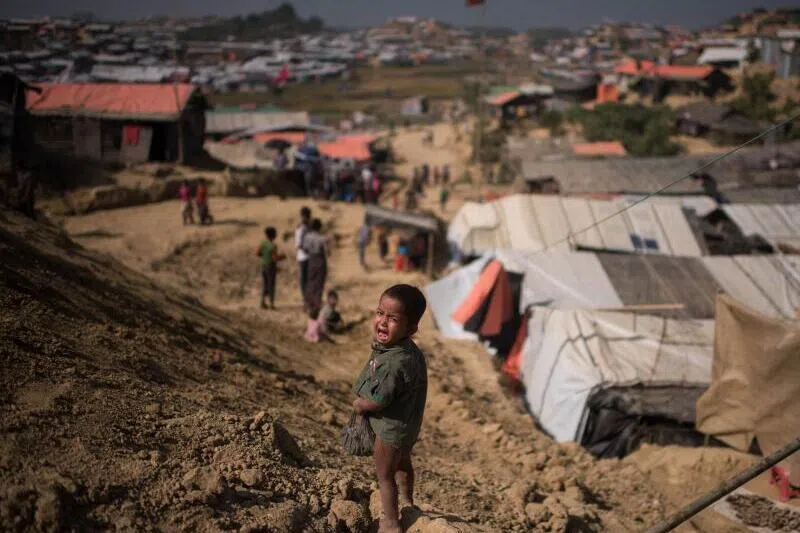US and European aid cuts could result in 22.6 million deaths worldwide, study finds
Sign up now: Get ST's newsletters delivered to your inbox

A Rohingya refugee child standing near a refugee camp at Cox's Bazar, Bangladesh.
PHOTO: AFP
Follow topic:
WASHINGTON - More than 22 million people, many of them children, could die preventable deaths by 2030 due to aid cuts by the United States and European countries, new research said Nov 17.
The findings are an update of a study earlier in 2025 that said US President Donald Trump’s sweeping reductions in assistance, including the dismantling the US Agency for International Development (USAid), could lead to 14 million additional deaths
The new research, seen by AFP, takes into account reductions in all official development assistance as Britain, France and Germany also slash their aid to the developing world.
“It is the first time in the last 30 years that France, Germany, the United Kingdom and the United States are all cutting aid at the same time,” said one of the new research’s authors, Gonzalo Fanjul, policy and development director at the Barcelona Institute for Global Health (ISGlobal).
“The European countries do not compare with the US, but when you combine all of them, the blow to the global aid system is extraordinary. It’s absolutely unprecedented,” he told AFP.
The research by authors from Spain, Brazil and Mozambique was submitted on Nov 17 to The Lancet Global Health and is awaiting peer review.
The research is based off data on how aid in the past has reduced deaths, especially in preventable areas such as HIV/AIDS, malaria and tuberculosis.
In a scenario in which aid cuts turn out to be severe, the new research expects 22.6 million excess deaths by 2030, including 5.4 million children under the age of five.
The researchers gave a range of 16.3 million to 29.3 million deaths to account for uncertainties, including which programmes will be cut and whether there are external shocks such as wars, economic downturns or climate-related disasters.
A milder defunding scenario would see 9.4 million excess deaths, the research said.
Major donors cut at once
Mr Trump, in a cost-cutting spree advised by the world’s richest person Elon Musk, soon after taking office slashed foreign assistance by more than 80 per cent and shut down USAid, which was the world’s largest aid agency and handled US$35 billion (S$45 billion) in the 2024 fiscal year.
Secretary of State Marco Rubio said that aid did not serve core US interests
Testifying before Congress, Mr Rubio denied any deaths from US aid cuts and accused critics of being beneficiaries of an “NGO industrial complex.”
Instead of seeking to fill the gap, Britain, France and Germany have also cut aid owing to budgetary pressure at home and decisions to focus more on defence spending following Russia’s invasion of Ukraine.
Among top donors of official development assistance, only Japan’s assistance has remained relatively steady over the past two years.
Beyond the immediate ends to projects, the study said that cuts would have knock-on effects by tearing down institutional capacities “painstakingly built over decades of international cooperation.”
Mr Fanjul acknowledged a need for countries to transition from the existing setup, especially their reliance on international HIV/AIDS funding.
“The problem has been the speed and the brutality of the process. In six months, we are experiencing a process that should have taken over a decade” or more, he said.
Professor Davide Rasella, the principal investigator on the latest research, put aid budgets in comparison by noting that the Trump administration has promised US$20 billion to prop up Argentina.
“In the world context these amounts of money are nothing huge,” Prof Rasella said.
Policymakers “change budgets and they really have no perception how many lives are at stake,” he said.
The research was funded by the Rockefeller Foundation and Spain’s science ministry.
A Rockefeller Foundation spokesperson said the New York-based philanthropy will “look forward to the publication of the peer-reviewed numbers, which will make even clearer the human cost of inaction and the profound opportunity we have to save lives.”
“This data is an urgent alarm for the world.” AFP

